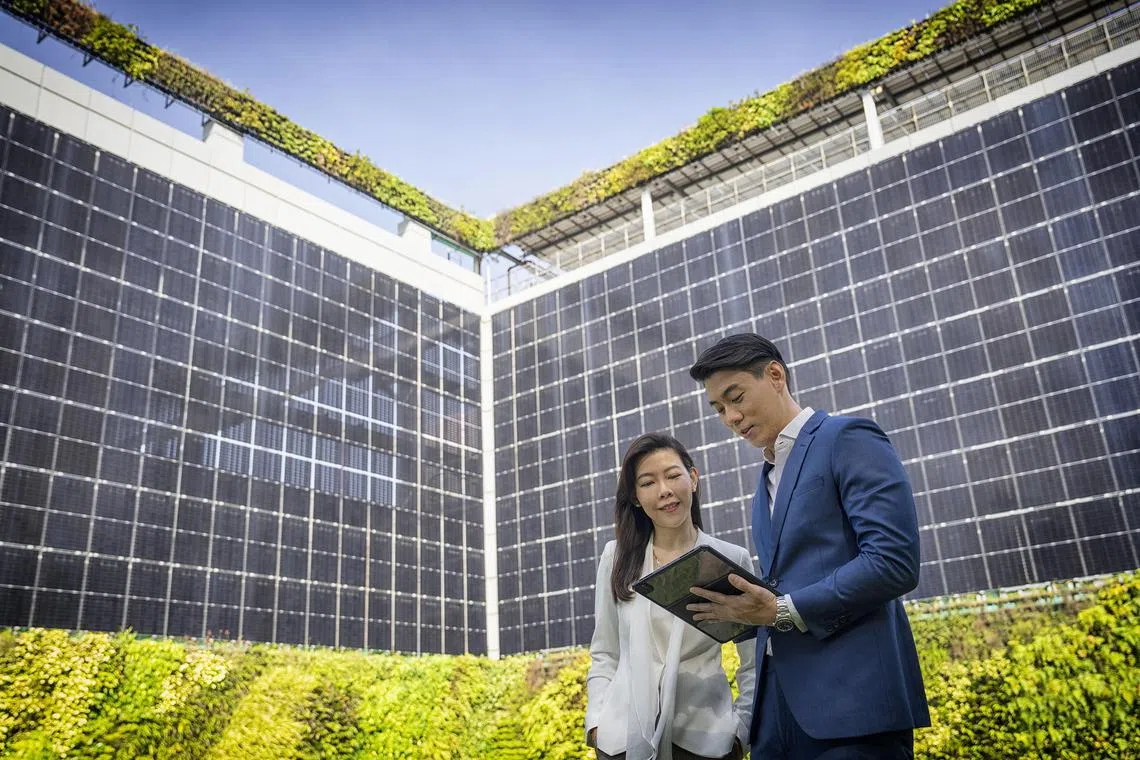Keppel making big strides in sustainability after moving away from oil rigs
Sign up now: Get ST's newsletters delivered to your inbox

Keppel Infrastructure @ Changi generates renewable energy that is more than double the building’s energy consumption each year.
PHOTO: KEPPEL
Follow topic:
SINGAPORE – Keppel has further ramped up its moves into sustainability after making waves in 2021 when it announced it would exit the oil-rig building business and shift its focus to infrastructure projects, including renewable energy.
Its chief executive Loh Chin Hua told The Straits Times: “Keppel has made good progress in our Vision 2030 transformation... to be a global asset manager and operator, and sustainability is a key part of our strategy.
“We are committed to making a positive impact – through running our business sustainably, investing in and creating solutions for a sustainable future, and contributing to the community through philanthropic efforts and staff volunteerism.”
His remarks came as Keppel released its latest sustainability report on May 26, which noted that the firm’s energy-efficiency measures and green initiatives delivered cost savings of about $95 million in 2023 for its asset owners and operators.
Keppel is also well on its way to hitting its sustainability targets, the report showed. In 2021, it set a target of halving its Scope 1 and Scope 2 carbon emissions by 2030 from 2020 levels, and achieving net zero by 2050.
It has reduced its Scope 1 and Scope 2 emissions by 69.5 per cent as at the end of 2023, and said it is confident of hitting net zero well ahead of 2050.
The company also increased its electricity utilisation from renewable energy to 23.1 per cent in 2023, up from 12.6 per cent in 2022. It aims to achieve 50 per cent renewable energy utilisation by 2025, and 100 per cent by 2030.
Besides carbon emissions, Keppel also significantly reduced its water withdrawal by 88 per cent and waste generation by 78 per cent, compared with 2019 levels. This is largely because it divested its offshore and marine business.
Investors have also appreciated Keppel’s sustainability efforts, said Mr Loh in the report.
The company launched its sustainability-linked financing framework, which includes key performance indicators and targets, in January 2024. It has since secured about $2.1 billion of sustainability-linked financing for general corporate purposes and to pursue opportunities in sustainability.
The sustainability mandate has also seen Keppel’s business strategy shift to reflect its focus on climate action. It is working on the development of Singapore’s first hydrogen-ready power plant, which broke ground in 2023 and is scheduled to be completed in 2026.
The Keppel report noted: “We are committed to doing our part to combat climate change. We have defined the kinds of pollutive sectors we will not go into, such as coal-fired plants; the businesses we will maintain; and those which we will focus more on, such as renewables, clean energy and decarbonisation solutions.
“We are also looking at developing solutions for carbon capture, utilisation and storage, as well as new energy vectors, such as green ammonia and hydrogen.”
Keppel also made strides in its social initiatives in 2023. It achieved zero fatalities across its global operations in 2023. It also unveiled a new company-wide diversity, equality and inclusion policy.
In 2023, women occupied about 37 per cent of senior management and managerial positions in Keppel, the report noted.
The average salaries, including cash incentives, of women at the senior management level exceeded men’s, at 109 per cent of their male counterparts’. Women at management levels had average salaries of about 99 per cent of those of their male counterparts.
A Keppel spokesperson told The Straits Times: “This reflects Keppel’s gender agnostic remuneration system, where compensation is highly linked to performance, and our commitment to appoint the best person for the job.”
The company was also named by Time magazine in its inaugural list of the world’s best companies, and listed as one of the world’s best employers by Forbes.
Mr Loh said: “We continue to execute Keppel’s strategy to not only run our business sustainably... but (also) to make sustainability our business through investing in and creating solutions that contribute to a sustainable future.”


